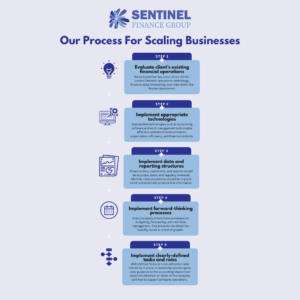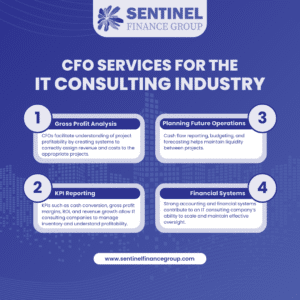A company is often prompted to find a CFO when the business starts to get more and more complex. A company’s leadership team may have concerns about the financial picture of the company and aren’t able to get the information they need. They need someone to oversee the finance team and bridge a gap in higher level finance experience. A company may also start looking for a CFO when a company receives funding and needs guidance, credibility, and professional reporting. But should a company hire a full-time or fractional CFO?
Companies often hire a fractional CFO instead of a full-time CFO for multiple reasons. First, it is more cost-effective. A full-time CFO is an expensive investment, requiring at least $150k annually plus benefits. This makes sense if you’re a very large corporation with a large financial department. However, it makes more sense for many companies to hire a fractional CFO part-time, for maybe 10 hours per week. Unless you have 40 hours of work for the highest-level financial expert, it’s more efficient to hire a fractional CFO since they only bill you for hours worked. A fractional CFO can still provide regular reporting and feedback and be part of board meetings and investor meetings, without being a full-time employee.
Another reason to hire a fractional CFO is because it is less commitment than hiring someone full-time. I have had clients who were unsatisfied with their full-time CFOs, but they stuck with them for many years because they had substantial sunk costs of onboarding, training, and benefits. If you hire someone under a contractual basis and you feel they aren’t bringing you value, it’s not as big of a deal to change. Therefore, hiring a fractional CFO is a way for business owners to mitigate risk.
Another reason hiring a fractional CFO minimizes business risk is because losing a fractional CFO will result in less knowledge loss than losing a full employee. A fractional CFO provides more procedure, documentation, and structure, so it’s easier to transfer information if you change CFOs. A full-time employee tends to be more entangled in the business culture and operations. I had a client with a full-time CFO who left the company with all of her knowledge, and it took a lot of time to replace her work.
When is the right time to hire a fractional CFO? Businesses could start engaging with one with even $100k in revenue, since they can hire someone for only a couple hours a week. If you need a CFO dedicated to your company during all business hours, you should hire a full time employee (a company that is probably around $50M-$100M in revenue). If your company only requires A CFO part-time, you should hire a fractional CFO.
I always recommend that companies start engaging a CFO in some capacity as early as possible. A CFO is a necessary addition to every business’s financial team, because unlike other financial roles, a CFO brings insights & local market knowledge, expertise about finance and accounting, credibility, and forward-thinking. The earlier a CFO provides financial structure, the earlier a company will be set up to run simply and efficiently, which will save money and allow more growth over the long-term. A CFO brings the expertise and oversight needed to create that sort of a financial structure.
Sentinel Finance Group is an outsourced CFO firm in Kansas City and provides fractional CFO services and controller services to local businesses.




